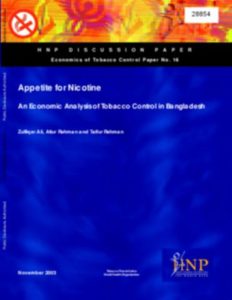
Abstract: The study estimates the economic issues related to tobacco. Cigarette and bidi production in Bangladesh have been increasing since 1980. Imports and exports have fluctuated, but there is a persistent negative trade balance in tobacco and tobacco products. Recent prevalence trends are not clear, but remain over 40% among men. National statistics put smoking among women at 4-5%, but tobacco chewing is common among women, and undocumented. Prevalence is much higher for men with lower incomes and education. Policies to reduce tobacco use are summarized, they have been relatively weak, but would be greatly enhanced if proposed legislation is enacted. Money spent on tobacco products by poor people could do much to reduce malnutrition if it were spent on food instead. Real prices of cigarettes have fallen, and incomes have risen, stimulating consumption.
Real price increases would help reduce demand, by 3% for every 10 real price increase. Taxes are relatively low (even for the highest priced, most taxed brands, only 55% of the retail price, plus a 15% value-added tax). Higher taxes would increase total revenues, already 7% of total government revenues. Inadequate data exist to estimate the health care costs attributable to tobacco use in Bangladesh.
Keywords: Bangladesh, tobacco, tobacco revenue, tobacco tax, tobacco industry, cigarette, price, price elasticity, health cost, tobacco control policy.
Disclaimer: The findings, interpretations and conclusions expressed in this paper are entirely those of the authors, and do not represent the views of the World Bank or the World Health Organization, their executive directors, or the countries they represent.
To read the full research please, click the download button. For source link, please click here.
Appetite for Nicotine
Ali, Zulfiqar; Rahman, Atiur; Rahman, Taifur

